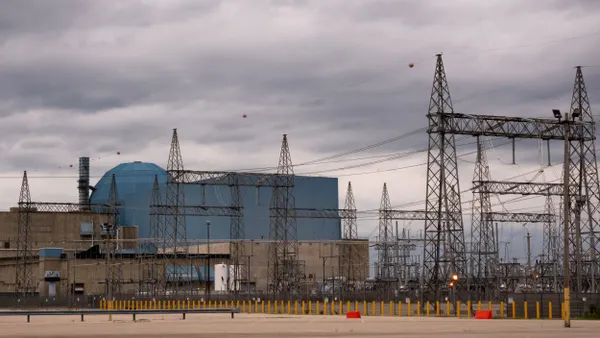Dive Brief:
- Texas regulators today are set to consider portions of Hunt's plan to purchase Oncor out of bankruptcy and set in motion a plan for the reorganization of Energy Future Holdings, but initial signs are that regulators have concerns over some of the plan's most controversial portions.
- Public Utility Commission of Texas Commissioner Ken Anderson has filed a letter, the Dallas Morning News reports, indicating some portions of the deal are a non-starter. Anderson wants more independent leadership at Oncor, and is demanding Hunt make assurances that the utility will maintain investment grade bond ratings.
- Hunt Consolidated has proposed purchasing Oncor and operating it as a real estate investment trust (REIT), and in doing so avoiding federal income taxes involved in the deal.
- Earlier this month, Commissioner Brandy Marty Marquez said she had reservations about the windfall, and would want to see that money flow back to ratepayers.
Dive Insight:
Critics of Hunt's plan for Oncor have long pointed to the complicated deal as a potential stumbling block, and regulators appear to be echoing those early concerns as the Public Utilities Commission closes in on a decision.
The PUC is slated to consider some portions of the deal today, including the tax windfall. Some critics have called for those dollars to flow to ratepayers, rather than allowing Hunt Consolidated to profit. Hunt's company asked for clarification on the structure and its rates, prompting Commissioner Anderson's letter.
The Dallas Morning News reports Anderson filed a response which read, in part: “Purchasers are asking this commission to prejudge the decisions that may come from the recently announced project to examine the treatment of federal income tax expenses ... This I cannot and will not do."
"Furthermore, making a decision about the status and amount of the federal income tax expense for any particular utility is an exercise best undertaken with facts fully developed in a full base rate-case proceeding," he continued. "What I am prepared to do is to acknowledge that Oncor’s current rates will remain in place, unchanged until the next base rate-case proceeding is completed.”
While that statement doesn't appear to lean one way or another, Anderson was more more blunt about other portions of the proposal, demanding assurances the utility would maintain its investment grade rating, and that the company would halt dividend payments if it did drop.
A spokesperson for Hunt Consolidated said Anderson has been pressing for indepth examination of the deal, and "we look forward to the commissioners’ discussions tomorrow."
But on whole, it does not appear positive for the Hunt investment group. Staff at the Public Utility Commission of Texas say the REIT arrangement would move $250 million annually from ratepayers to shareholders.
Commissioner Marty Marquez has previously said "there’s something very lucrative and attractive about this particular structure, and I cannot be okay with a windfall on the back of those ratepayers. ... In my opinion, they’re not entitled to any of it.”
Concerns have also been raised that the deal could raise bills for some customers. Sharyland Utilities, Hunt's smaller power provider, struggles with high rates in a rural service territory. Merging Sharyland with Oncor would lower rates for 50,000 Sharyland customers, but Oncor officials are wary of the impact on their own ratepayers.
Sharyland customers are already paying almost twice the state average in power prices, but Oncor is warning regulators that combining the two could raise rates for its current customers by 1.25%. “The bottom line is, while an Oncor and Sharyland combination may make sense at some point, the impact on Oncor and its customers should be carefully examined,” the utility said in a filing earlier this month














